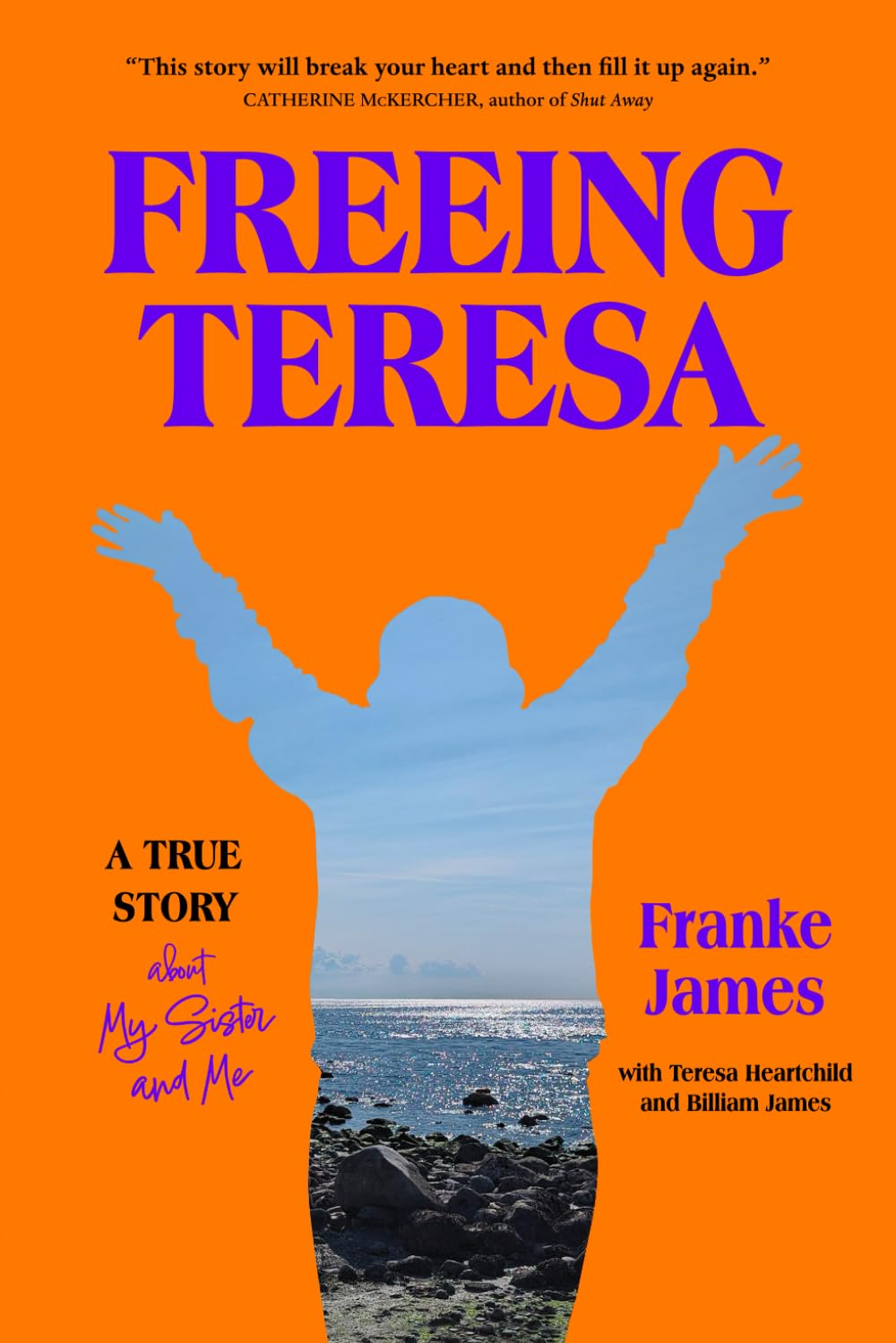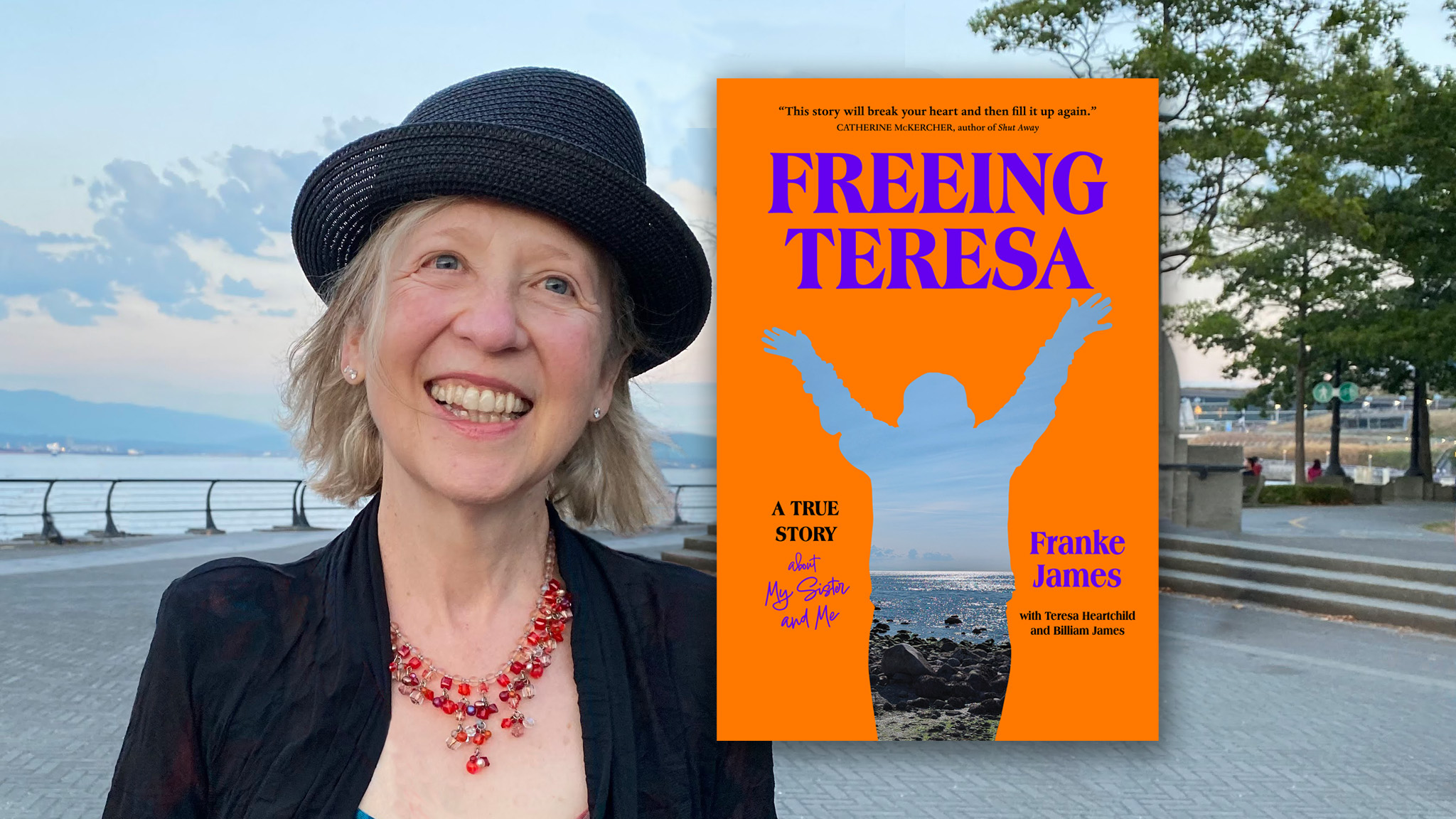Freeing Teresa by Franke James
“Forced care is happening to people with disabilities around the world. Most people don’t escape. And the world shrugs.”
Should everyone have the right to choose where they live? The answer seems obvious — of course, choosing where you live is a basic human right.
But for Teresa Heartchild, an artist, self-advocate and author who has Down syndrome, everything changed when that right was taken away from her. Teresa’s older sister, Franke James, gives a true account of the arduous path that led to Teresa’s wrongful institutionalization and eventual rescue in her memoir, Freeing Teresa.
In this Q&A with BookTrib, we talk with Franke James about her previous experience with activism, how things have changed in the ten years since freeing her sister and how she’s working to get the word out about situations of injustice just like Teresa’s.
Besides your lived experience that inspired this memoir, what was the process of writing and researching for this book?
When the actual events were happening, I kept my sanity by documenting everything, imagining that I would someday write a book. The first scene opens with cops knocking at the door. One of my older sisters shouted at the police that I had a recorder, as though it was a dangerous weapon. I held my silver recorder up high and asked if I could record, and the cops said it was okay. So I recorded everything. And ten years later, I have relied on my audio recordings, emails, photos and videos to tell the story and get things right.
But along the way, I became my sister’s caregiver, researched disability rights and became active in the disability movement here. It was all good research for the book.
In what ways has life changed for your family in the 10 years since freeing Teresa?
Every way! Everything is different now. Those events a decade ago totally changed our lives.
We enjoyed our old life. We had nice friends, a nice business and a nice house which we had almost finished renovating. But when the shit hit the fan, we dropped everything. We moved thousands of miles from the East to the West. We had to escape for our emotional well-being. We were very lucky that we could do that. We’re very happy. Teresa is now an award-winning author, artist, self-advocate and human rights champion. Of course, on the downside, I’ve been shunned by my siblings for a decade, but that is the price of doing what you believe is right — in the face of intense opposition.
How did your climate change activism lay the foundation for your fight for disability rights?
My climate change activism taught me how to defend my sister — and those lessons are woven through the book. The government censorship taught me many useful things: how to stand my ground, document everything, dig for FOI evidence, build a global support network and reach out to the media. Ultimately, I learned how to turn the tables so that the censorship became international news — my book, Banned on the Hill, was written about in The UK Guardian and other papers. I don’t think that everything happens for a reason, but I couldn’t have freed Teresa without that activist experience!
Who would you say is your target audience for this book?
Anyone who has experienced rejection for being different will “get” this book in a heartbeat. Teresa and I couldn’t change who we were — so we had to leave our birth family to be ourselves.
Fans of social justice books and true account-style nonfiction should enjoy it. Freeing Teresa has action and dialogue, which makes it different from most memoirs. They say that truth is stranger than fiction, and in this case, it really is.
Freeing Teresa is important for the disability community, including parents and siblings. We’re speaking at a disability conference about the issues raised in it. I’ve also heard from law professors and people in healthcare and disability organizations who are using the book in seminars to teach about ableism and disability rights.
Midwest Books said, “The result is more than a memoir: it’s a testimony to how ‘tickets to freedom’ are gained through fighting and love.”
What do you hope people take away from Freeing Teresa?
The power of love. What are we willing to do to protect someone we love? I hope people will come away with the resolve to speak up — and the difference it can make.
I wish I’d known of the disability mantra “nothing about us without us.” Teresa was left out of the loop in planning her own future — and she shouldn’t have been. Things would have been very different if she had been actively involved.
How are you working to get the news out about Freeing Teresa?
I’ve been speaking and writing to spread the word that Teresa is just the tip of the iceberg. There are many thousand “Teresas” in Canada and the USA. The U.N. says it’s happening worldwide and that it’s “a human rights violation on a massive global scale.”
Teresa and I will appear at a disability conference in May. We’re on a panel called “The Quiet Reinsinstitutionalization of Young People with Disabilities in Nursing Homes.” Teresa has such an important role to play because she is a living example of someone who was wrongly placed and it should never have happened.
I’m also writing op-eds and doing podcasts to amplify the message. Last week, I was on a health-related podcast prompted by my op-ed. Several disability organizations in the USA have had me on their podcasts because the issue of segregation vs. living in the community, is big there, too. Dave Matheis, at the Center For Accessible Living in Kentucky, said, “Our interview with Franke James about her book Freeing Teresa has been one of our most popular podcast episodes to date.”
An audiobook of Freeing Teresa is currently in development. What news can you share about that?
I’m so excited about the audiobook! It’s got a full cast of thirteen actors and they really bring the story to life in dramatic ways. Lauren Potter, the US television star who was in GLEE, is playing the role of Teresa Heartchild. Like my sister, Lauren has Down syndrome. She is fabulous and I can hardly wait for people to hear the whole audiobook. It is being mixed now, and we expect it to be released in May/June.
What can readers expect from your next book Escape to Lotusland?
It’s a wild ride — the rollercoaster continues for the three of us. We face a ton of obstacles from the system and my siblings, and remarkably, Teresa finds her voice as a self-advocate and speaks up!
About the authors of Freeing Teresa:
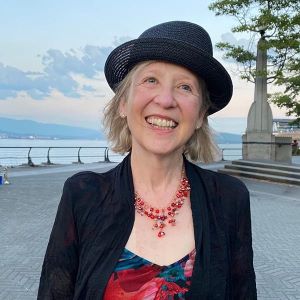 Franke James is an artist, activist and the author of four books on human rights, climate change, free expression and ethics. For her, these issues are all connected by the need to speak up and take action. The spark for Freeing Teresa was lit in 2013. Franke and her husband Billiam James helped her younger sister get out of a nursing home and then helped Teresa ask for an apology. Earlier that same year, Franke had published Banned on the Hill, which led to her winning the BC Civil Liberties Award for Excellence in the Arts. Her related poster campaign, “Do Not Talk About Climate Change,” appeared in three Canadian cities and Washington, DC. In 2015, Franke was awarded PEN Canada’s Ken Filkow Prize for “tenacity in uncovering an abuse of power and commitment to fostering a national conversation in the face of censorship.” Franke lives in Vancouver, BC, with her husband and her sister, Teresa.
Franke James is an artist, activist and the author of four books on human rights, climate change, free expression and ethics. For her, these issues are all connected by the need to speak up and take action. The spark for Freeing Teresa was lit in 2013. Franke and her husband Billiam James helped her younger sister get out of a nursing home and then helped Teresa ask for an apology. Earlier that same year, Franke had published Banned on the Hill, which led to her winning the BC Civil Liberties Award for Excellence in the Arts. Her related poster campaign, “Do Not Talk About Climate Change,” appeared in three Canadian cities and Washington, DC. In 2015, Franke was awarded PEN Canada’s Ken Filkow Prize for “tenacity in uncovering an abuse of power and commitment to fostering a national conversation in the face of censorship.” Franke lives in Vancouver, BC, with her husband and her sister, Teresa.
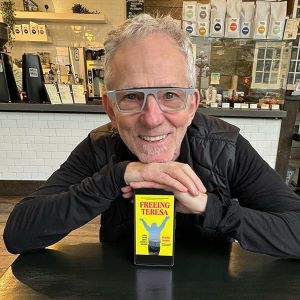 Billiam James is an activist, artist, designer and award-winning videographer. In 2013, he helped his wife, Franke, get her younger sister, Teresa, out of a nursing home and brought her to live with them. Together, they helped Teresa ask for an apology for the wrongful institutionalization. After two years of campaigning, the Ontario Minister of Health publicly apologized to Teresa. Billiam combines storytelling, visual art, music and social activism to effect change. Over the past three decades, he has produced creative work addressing the following themes: disability rights, mental health, climate change and free speech. He lives in Vancouver, BC, with Franke James and sister-in-law Teresa Heartchild.
Billiam James is an activist, artist, designer and award-winning videographer. In 2013, he helped his wife, Franke, get her younger sister, Teresa, out of a nursing home and brought her to live with them. Together, they helped Teresa ask for an apology for the wrongful institutionalization. After two years of campaigning, the Ontario Minister of Health publicly apologized to Teresa. Billiam combines storytelling, visual art, music and social activism to effect change. Over the past three decades, he has produced creative work addressing the following themes: disability rights, mental health, climate change and free speech. He lives in Vancouver, BC, with Franke James and sister-in-law Teresa Heartchild.
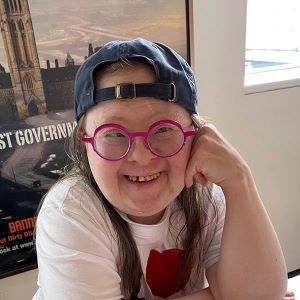 Teresa Heartchild is an artist, self-advocate and author who has Down syndrome. Teresa has shown remarkable resilience and courage. In 2013, a social worker said she was incapable of deciding where she would live. Teresa was put into a Toronto nursing home. Within days, her father, her sister Franke, and her brother-in-law, Bill, helped her get discharged. Teresa had a new capacity test done that determined she could decide where to live. Two years of campaigning later, BC Civil Liberties wrote to the Ontario government on Teresa’s behalf: “We are gravely concerned that the government, through its actions, appears to condone the forced placement and mistreatment of developmentally disabled adults.” The Ontario Minister of Health responded by publicly apologizing to Teresa. The BC Human Rights Commissioner named Teresa a “Champion for Change.” In 2023, Teresa is celebrating the 10-year anniversary of her rescue and lives with her sister, Franke, in Vancouver, BC.
Teresa Heartchild is an artist, self-advocate and author who has Down syndrome. Teresa has shown remarkable resilience and courage. In 2013, a social worker said she was incapable of deciding where she would live. Teresa was put into a Toronto nursing home. Within days, her father, her sister Franke, and her brother-in-law, Bill, helped her get discharged. Teresa had a new capacity test done that determined she could decide where to live. Two years of campaigning later, BC Civil Liberties wrote to the Ontario government on Teresa’s behalf: “We are gravely concerned that the government, through its actions, appears to condone the forced placement and mistreatment of developmentally disabled adults.” The Ontario Minister of Health responded by publicly apologizing to Teresa. The BC Human Rights Commissioner named Teresa a “Champion for Change.” In 2023, Teresa is celebrating the 10-year anniversary of her rescue and lives with her sister, Franke, in Vancouver, BC.
